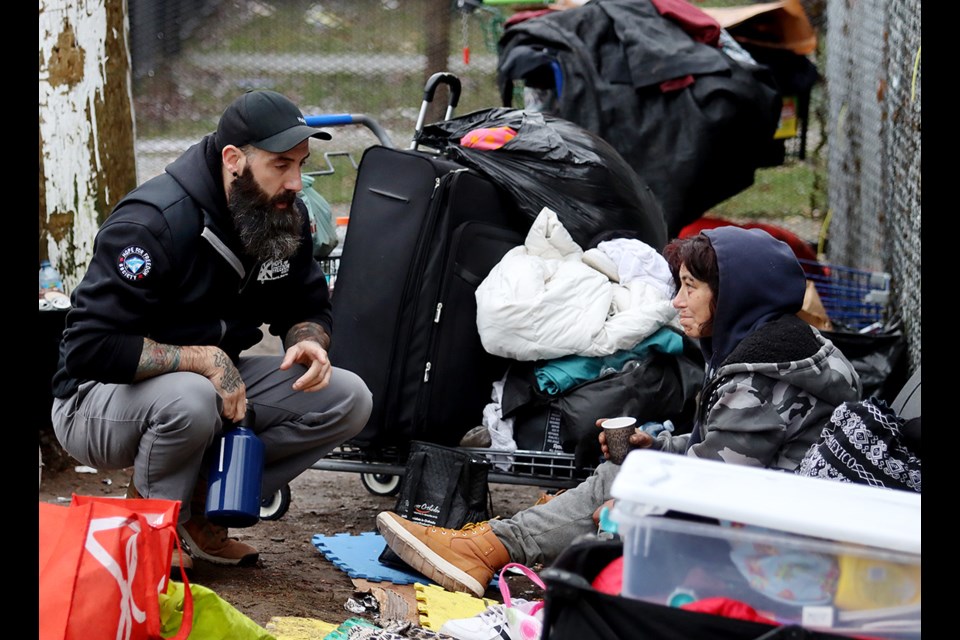Port Coquitlam’s A-Team doesn’t wear khaki cargo pants or drives a black van with a red spoiler.
But like the fictional TV team of mercenaries from which Adam, Amanda and Aaron of the Hope For Freedom Society have adopted their nickname, they spend their days fighting for what’s right: Providing some comfort and goodwill to the Tri-Cities’ homeless population.
Adam Thompson — one of the A’s — says the group’s mission is simple.
They provide the basic necessities to those whose every moment is a toil of survival while offering a conduit to resources that might help ease their struggles, and maybe even get them off the street or out of the bushes.
It’s a job that requires boots on the ground — or rather, a blue van on the road — every day beginning at 7 a.m. when the overnight shelters release their guests to fend for themselves through the daylight hours.
Thompson’s van is stockpiled with supplies that could make the difference between a good day and bad: hot chocolate, candy bars, cigarettes, feminine products, blankets, backpacks, hand warmers.
His rounds take him to the sidewalks, alleyways, garages and parks in Port Coquitlam and Coquitlam where the homeless might hunker down to get out of the rain or cold, or just get some respite from the rigours of existence.
In his 14 months on the job, Thompson said he’s learned to see the signs of street life that would otherwise be easy to miss: a piece of cardboard wrapped around a vent pipe in a parkade to direct warm air, a twist cap from a water bottle with its seal cracked secreted in a patch of grass for future use to administer a fix.
Street cred
Before starting this gig, he said, he was on the road to becoming homeless himself after losing everything to fentanyl addiction.
That near miss, Thompson said, gives him the street cred with the people he meets every day, equips him with the compassion needed to see the humanity in their struggles and the empathy that might just crack the door back to “normie” life.
“To have the past that I have, the population we assist appreciate that I’ve been there,” he said.
It’s not an easy job, Thompson said.
The “wins” are few and incremental.
A nod of greeting, a hand extended, a conversation initiated.
The losses often go home with him at night.
“The things that nag at you are the things you think you may have missed,” he said.
But when one of his clients lets him in to begin the monumental steps of rebuilding their life, it’s affirming, Thompson said.
A success story
That was the case with Brian, who once ran an autobody shop in Port Moody until he fell on hard times and ended up in a decrepit RV parked near the PoCo bottle depot and piled high with his worldly possessions that mostly consisted of large jerry cans filled with his urine.
“It was the worst living situation I’ve ever seen,” Thompson said.
Now living in a rooming house in an established PoCo neighbourhood next to the Coquitlam River, Brian said he was depressed as he gave his life over to booze.
“I was letting myself go,” he said. “I knew something had to change.”
Knock on his door
When Thompson and another member of his team, Amanda, knocked on his door, he knew that change had come.
But, Brian worried, where would it take him? Would he be institutionalized? Would he be sent to rehab even though he doesn’t do drugs?
Thompson said it’s a common worry.
People living on the streets don’t have much other than their self-sufficiency and independence; many clutch those fiercely.
Convincing Brian he could still be independent and have a safe place to begin rebuilding his life “took a bit of coaxing,” Thompson said.
A month later, Brian has a warm room with a proper bed and assurances of his next meals.
“It was a huge moment in my life,” he said of his decision to finally accept help, adding he now has the freedom to look beyond his next waking moment.
He’s even armed himself with colouring pencils to sketch the nearby woods and create bright, geometric designs on squares of paper.
The situation is getting worse
Thompson said he’s seeing more Brians show up in the Tri-Cities as the situation in Vancouver’s Downtown Eastside continues to deteriorate.
Shelters can’t keep up with the need and the rapid pace of development in Coquitlam’s City Centre neighbourhood is diminishing the places they can hunker down.
“The need is real,” Thompson said.
• To learn more about the Hope For Freedom Society, go to their website hopeforfreedom.org.



